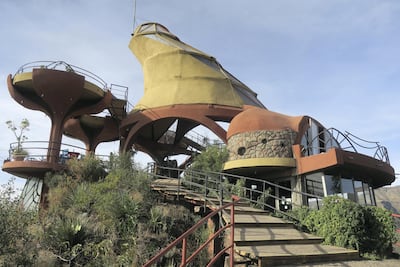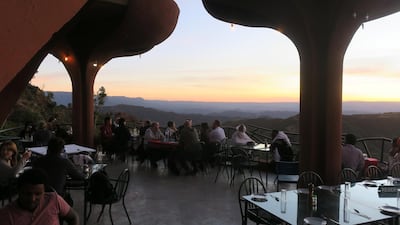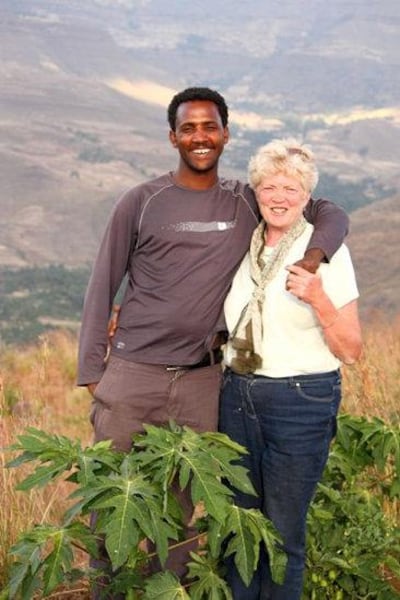Not many pensioners would move from a small town in Scotland to the mountains of East Africa to find their life's calling. But that's exactly what former schoolteacher Susan Aitchison, 68, did when she opened a lavish restaurant in Lalibela, Ethiopia, seven years ago.
Aitchison gets by with basic Amharic, the language commonly spoken in northern Ethiopia, and can be found cheerily greeting patrons who flock to her eatery, Ben Abeba, for sunset views and international cuisine. "They are the loveliest, friendliest people, and it is my privilege to have been accepted to live here," she says.
During a break between hectic lunch and dinner shifts in the winter high season, Aitchison reflects with The National on her unlikely journey to the place she now calls home.

It all began in the summer of 2007, as she faced a turning point in her life. Divorced, with no children, Aitchison approached looming retirement and had plenty of spare time after nearly four decades of teaching. On a whim, she agreed to help a neighbour in her home town of Motherwell set up a non-profit school an hour outside of Lalibela, a place revered as the “New Jerusalem” by Ethiopians. Famous for its ancient rock-hewn churches, the holy town attracts tens of thousands of pilgrims for Orthodox Christmas each January.
'It's the safest place in the world'
Aitchison was instantly taken by Ethiopia’s culture and “sense of family, which I think we’ve lost [in Britain] somewhere down the line,” she says. The admiration was mutual, and locals soon embraced “Mama Susie” as one of their own. “Ethiopians are happy and friendly, even though the majority live in extreme poverty,” she says. And yet, she adds, “it’s the safest place in the world”.
Soon after arriving in Lalibela, Aitchison met her future business partner, Habtamu Baye, who drove her on the 35-kilometre, bumpy journey to school each week in the only 4x4 in town. “She was very positive from the beginning to do something for the community,” recalls Baye, who was 22 at the time.
As a former home economics teacher, Aitchison encouraged the young Ethiopian to pursue his dream of opening a small restaurant and offered to train his staff. Instead, Baye asked her to join as a full-time partner. She faced a decision: should she return to her home country? After three years of travelling to Ethiopia in the summers, the school she was tasked with opening was already up and running, and Aitchison was set to return to Motherwell, to begin receiving her state pension.
“What’s life in Scotland?” she remembers thinking. “Today in January it’s pretty cold there, and it’s beautiful here, and I thought, ‘Why not?’”
“OK,” she told Baye. “If you’re game then I’m game.”
'A nightmare'
The pair found the perfect plot of land, which overlooks a nearby valley, with views of sunsets sinking into the distant mountains. The problem was, it belonged to farmers who were legally prohibited from selling land privately. “There was a lot of bureaucracy,” Baye says. “It was a nightmare.”

They eventually won a 99-year lease in a public auction. By then, Baye’s vision of a small restaurant had grown substantially. Today, Ben Abeba resembles a massive amusement park ride, complete with a looping ramp circling up to the idyllic rooftop. The restaurant’s modern design ensures open-air seating for more than 250 diners – most of them tourists coming in from China, the US and other parts of Africa.
Many customers are taken aback by the futuristic structure in a town known for its 800-year-old underground churches. "Ben Abeba puts this country in a good light – that makes me feel proud," says Baye, now 34 and married, with a third child on the way.
“For more than 30 years, people have been talking about Bob Geldof and starvation when they talk about Ethiopia,” he adds, referring to the 1985 Live Aid concert for famine relief. “But now they can see beyond that.”

'Mountain flower'
The restaurant gets its name from a combination of the Gaelic word for mountain (ben) and the Amharic word for flower (abeba). It caters to locals and westerners, sometimes mixing the cuisines. Their version of shepherd's pie with shiro, a spicy Ethiopian chickpea stew, is a big hit. Ethiopian dishes start with customary injera, a teff flour flatbread, topped with a selection of vegetarian dishes or a meat stew known as tibs. Also on the menu are British staples such as bubble and squeak, as well as omelettes and chips.
The restaurant has 50 full-time employees, and functions as a training platform for young locals looking to break into the industry – an Ethiopian take on Jamie Oliver’s Fifteen restaurant in London, if you will. The business partners also support a number of local charities, and offer free celebratory meals to the area’s youth football club, after they win. “All these Russian oligarchs own their fancy clubs, and we have a great one right here in Lalibela,” giggles Aitchison, who remains loyal to Motherwell FC.
The partners are keen to support the environment, too. The restaurant is eco- friendly, and 50,000 trees have been planted in the surrounding area, to cultivate natural wildlife. Now, the shelter that's located below the restaurant serves as a kind of halfway house for the odd abandoned antelope. Last year, staffers rescued a days-old klipspringer and named her Susie. "Once they get a name, they have a home forever," says Aitchison, who encourages visitors to pop into Susie's quarters.
Like her namesake, Aitchison now has a permanent home in Lalibela. Although she returns to Motherwell every summer to avoid Ethiopia’s rainy season, the idea of settling there for good is met with fierce resistance from her adopted community. “I’m saying: ‘Right, when the legs don’t work and the brain doesn’t work, I will need to go back to an old people’s home,’” she says. “And here it’s, ‘No, no, no, Susie, you’re part of our family now.’
"The old people are all looked after here, and they are part of the home," Aitchison adds. "And we don't have that in Britain."

